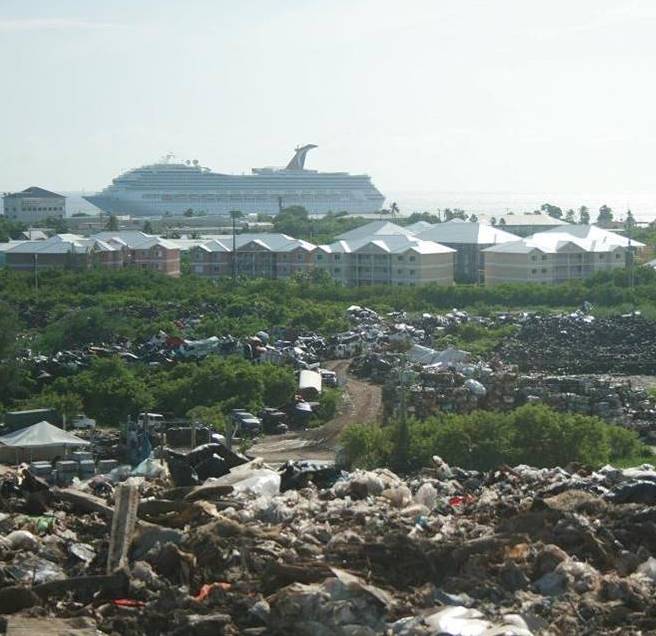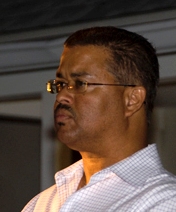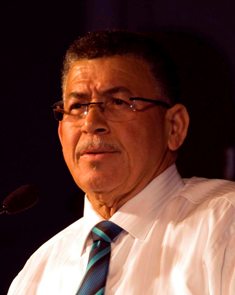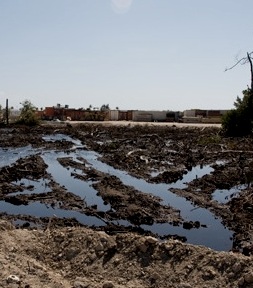 Headline News
Headline News

Machete attack on the Brac
 (CNS): Updated – Police said on Friday afternoon that officers have now charged a 46 year old man with wounding causing GBH and assault causing ABH following a machete attack on Wednesday 22 September on Cayman Brac. A 32-year-old man was admitted to Faith Hospital after the incident that occurred at about 8.20 int the evening. The two men who were reportedly attending a family event in the Watering Place area became involved in an altercation. During the fight one of the men attacked the other with a machete, police said. The injured man suffered lacerations to his body and he is understood to still be in hospital at this time, where his condition is described as stable.
(CNS): Updated – Police said on Friday afternoon that officers have now charged a 46 year old man with wounding causing GBH and assault causing ABH following a machete attack on Wednesday 22 September on Cayman Brac. A 32-year-old man was admitted to Faith Hospital after the incident that occurred at about 8.20 int the evening. The two men who were reportedly attending a family event in the Watering Place area became involved in an altercation. During the fight one of the men attacked the other with a machete, police said. The injured man suffered lacerations to his body and he is understood to still be in hospital at this time, where his condition is described as stable.
Police have not yet named the individual who has been charged and is still in custody. CNS has been unable to confirm if the man appeared before the courts on Friday.

Waste-to-energy ‘won’t work’
 (CNS): Despite the fact that government appears committed to dealing with the country’s landfill problem by burning it, experts have revealed that not much more than a quarter of the million tonnes of rubbish at the dump can be burned. A group of local activist has said that while waste-to-energy can form part of a solution, it falls far short of addressing the country’s growing garbage problem. Aside from being environmentally unsound, expensive and long term, WTE will also encourage us to produce more waste rather than reduce it. Walling Whittaker said Cayman doesn’t produce enough rubbish to make a WTE project cost effective andthat an integrated management programme is the country’s best hope. (Photo a view from the dump Walling Whittaker)
(CNS): Despite the fact that government appears committed to dealing with the country’s landfill problem by burning it, experts have revealed that not much more than a quarter of the million tonnes of rubbish at the dump can be burned. A group of local activist has said that while waste-to-energy can form part of a solution, it falls far short of addressing the country’s growing garbage problem. Aside from being environmentally unsound, expensive and long term, WTE will also encourage us to produce more waste rather than reduce it. Walling Whittaker said Cayman doesn’t produce enough rubbish to make a WTE project cost effective andthat an integrated management programme is the country’s best hope. (Photo a view from the dump Walling Whittaker)
Cop faces trial for assault
(CNS): RCIPS officer Rabe Welcome will face a Grand Court trial on charges of common assault and wounding in connection with an incident at the Red Bay Esso gas station last year, following a Summary Court enquiry. However, charges against his fellow officer Adrian Clark have been dismissed following a successful ‘no case’ submission by his attorney, John Meghoo. Both officers were suspended from duty following a police investigation into allegations of brutality by three off-duty officers after a man received a broken arm during an incident at the gas station in June 2009. Welcome is accused of using excessive force during the incident which caused the man’s injuries.

Clifford: Miller taking lead
 (CNS): Former tourism minister CharlesClifford has said he believes the independent member for North Side is emerging as a more effective opposition spokesperson than the official leader of the opposition. Clifford, who recently resigned from the People’s Progressive Movement, the party in which he served as a Cabinet minister, told CNS that Ezzard Miller was increasingly taking the role that people would expect to be filled by the PPM party leader Kurt Tibbetts. He pointed out that on all the major issues, at present, the North Side MLA was the first on his feet in the Legislative Assembly to point out the problems that government’s policies may cause and to speak on behalf of the people. (Photo Dennie Warren Jr)
(CNS): Former tourism minister CharlesClifford has said he believes the independent member for North Side is emerging as a more effective opposition spokesperson than the official leader of the opposition. Clifford, who recently resigned from the People’s Progressive Movement, the party in which he served as a Cabinet minister, told CNS that Ezzard Miller was increasingly taking the role that people would expect to be filled by the PPM party leader Kurt Tibbetts. He pointed out that on all the major issues, at present, the North Side MLA was the first on his feet in the Legislative Assembly to point out the problems that government’s policies may cause and to speak on behalf of the people. (Photo Dennie Warren Jr)

One man arrested for nightclub murder
 (CNS): More than a year after the shooting, police have announced that a 24-year-old man has been arrested in connection to the death of Carlo Webster. The 24-year-old man, who is from the West Bay area, was arrested earlier this morning (Wednesday 22 September) on suspicion of murder, police revealed. Webster was gunned down in the Next Level Nightclub, on the West Bay Road, on 10 September in a shooting which police have said they believed was connected with a tit for tat escalation of gang violence throughout 2009. Webster was shot in the head in front of over one hundred people who were in the club that night. Police have not named the man and have not indicated if he was already in custody or not. However, a spokesperson said that enquiries into the shooting continue.
(CNS): More than a year after the shooting, police have announced that a 24-year-old man has been arrested in connection to the death of Carlo Webster. The 24-year-old man, who is from the West Bay area, was arrested earlier this morning (Wednesday 22 September) on suspicion of murder, police revealed. Webster was gunned down in the Next Level Nightclub, on the West Bay Road, on 10 September in a shooting which police have said they believed was connected with a tit for tat escalation of gang violence throughout 2009. Webster was shot in the head in front of over one hundred people who were in the club that night. Police have not named the man and have not indicated if he was already in custody or not. However, a spokesperson said that enquiries into the shooting continue.
On the night of the incident the 911 Emergency Communications Centre received a call froma member of the public reporting that a shooting had occurred inside Next Level. Police responded to the scene and found a man in his thirties inside the club who had received fatal gunshot wound. Another man was then found at the rear of the club suffering from a gun shot wound to his abdomen.

Mac vows 3 months to success
 (CNS): During a television address last week the country’s premier said he was putting forward “specific measures” to address the country’s declining economic fortunes. McKeeva Bush told the public that he was confident that within 90 days of the TV broadcast (16 September) Cayman would be back on the path to success. Bush listed a number of proposals that were being considered to improve the economy, and after a period of consultation he said he would deliver anotherpublic speech revealing which proposals government intended to implement. The premier did not reveal the exact details of the measures he had spoken about but said government would encourage new business to invest here.
(CNS): During a television address last week the country’s premier said he was putting forward “specific measures” to address the country’s declining economic fortunes. McKeeva Bush told the public that he was confident that within 90 days of the TV broadcast (16 September) Cayman would be back on the path to success. Bush listed a number of proposals that were being considered to improve the economy, and after a period of consultation he said he would deliver anotherpublic speech revealing which proposals government intended to implement. The premier did not reveal the exact details of the measures he had spoken about but said government would encourage new business to invest here.

Health insurance in recovery
 (CNS): Insurance firms will no longer be able to cherry pick who they insure as a result of amendments to the Health Insurance Law passed in the Legislative Assembly recently. The road to recovery for the country’s health insurance regime is likely to be a long one but the health minister has made a number of amendments to provide for increases in fines, improve the administration of the law, as well as bring wider and more comprehensive coverage for all. The first step in what Mark Scotland said would be a comprehensive overhaul of the system and improvements to the basic health package, the changes will hopefully address the myriad complaints received about the sector. Scotland said that in the last year alone the Health Insurance Commission received over 1400 complaints.
(CNS): Insurance firms will no longer be able to cherry pick who they insure as a result of amendments to the Health Insurance Law passed in the Legislative Assembly recently. The road to recovery for the country’s health insurance regime is likely to be a long one but the health minister has made a number of amendments to provide for increases in fines, improve the administration of the law, as well as bring wider and more comprehensive coverage for all. The first step in what Mark Scotland said would be a comprehensive overhaul of the system and improvements to the basic health package, the changes will hopefully address the myriad complaints received about the sector. Scotland said that in the last year alone the Health Insurance Commission received over 1400 complaints.
Lisa becomes season’s twelfth tropical storm
(CNS): As Igor began to lose its tropical characteristics this morning, back across the Atlantic a tropical depression blew into the season’s twelfth named stormed. Tropical Storm Lisa is 530 miles west north west of the Cape Verde Islands and looks to be heading out into the mid Atlantic. Maximum sustained winds are currently 40 mph as Lisa slowly heads towards the north at near 5mph. Forecasters from the NHC said the current general motion is expected to continue during the next 24 hours before a turn toward the north-northwest with a slight decrease in forward speed on Wednesday. Additional strengthening is forecast during the next couple of days and tropical storm force winds extend outward up to 40 miles from the centre.

Violators to lose T&B licence
 (CNS): The employment minister has said that the Pensions Law needs to be enforced in such a way that the money owed to employees gets into their pension funds rather then trying to prosecute offenders through the courts. A report by Complaints Commissioner Nicola Williams revealed a catalogue of problems with private sector pensions, including the theft of employee contributions from employers, and recommended a complete overhaul of the legislation. Rolston Anglin has said that his ministry has been focused for several months now on creating a new system in which employers will be held accountable for the pension contributions they owe through administrative fines and the removal of trade and business licences.
(CNS): The employment minister has said that the Pensions Law needs to be enforced in such a way that the money owed to employees gets into their pension funds rather then trying to prosecute offenders through the courts. A report by Complaints Commissioner Nicola Williams revealed a catalogue of problems with private sector pensions, including the theft of employee contributions from employers, and recommended a complete overhaul of the legislation. Rolston Anglin has said that his ministry has been focused for several months now on creating a new system in which employers will be held accountable for the pension contributions they owe through administrative fines and the removal of trade and business licences.

Chuckie defends duty waivers
 (CNS): Following the premier’s criticisms of the previous administration for giving the developer of the Ritz Carlton concessions on his latest project, the former tourism minister has defended the decision and said the waivers were given when the country was headed into recession. Charles Clifford said the PPM administration offered Michael Ryan, the developer of Dragon Bay, various concessions in order to encourage him to go ahead with the project at a time when many other developments were being cancelled. He said the goal was to stimulate the construction sector, but he added that the former administration should have pushed Ryan to meet his obligation to build a new Port Authority marina. (Photo Dragon Bay site Dennie WarrenJr)
(CNS): Following the premier’s criticisms of the previous administration for giving the developer of the Ritz Carlton concessions on his latest project, the former tourism minister has defended the decision and said the waivers were given when the country was headed into recession. Charles Clifford said the PPM administration offered Michael Ryan, the developer of Dragon Bay, various concessions in order to encourage him to go ahead with the project at a time when many other developments were being cancelled. He said the goal was to stimulate the construction sector, but he added that the former administration should have pushed Ryan to meet his obligation to build a new Port Authority marina. (Photo Dragon Bay site Dennie WarrenJr)